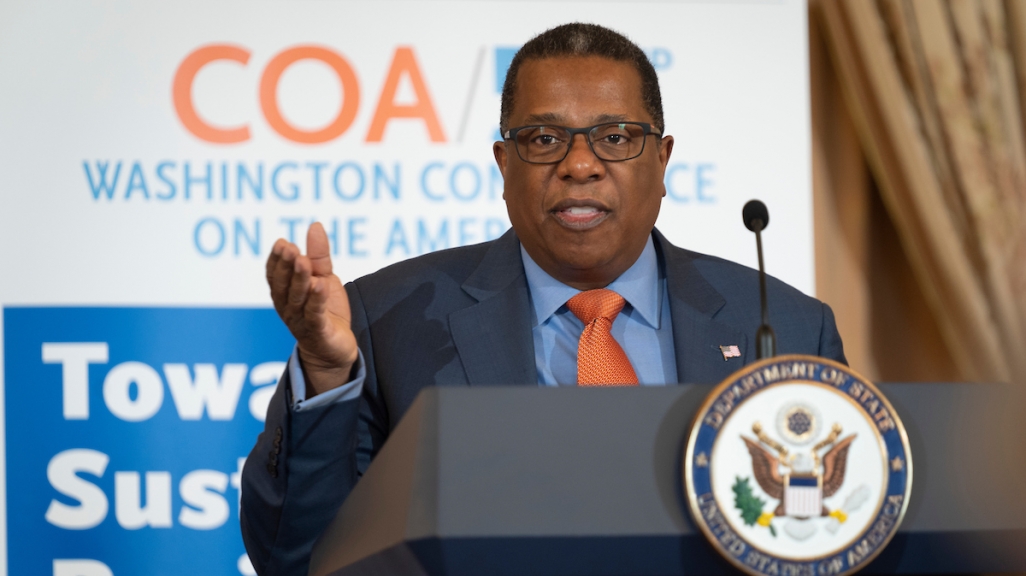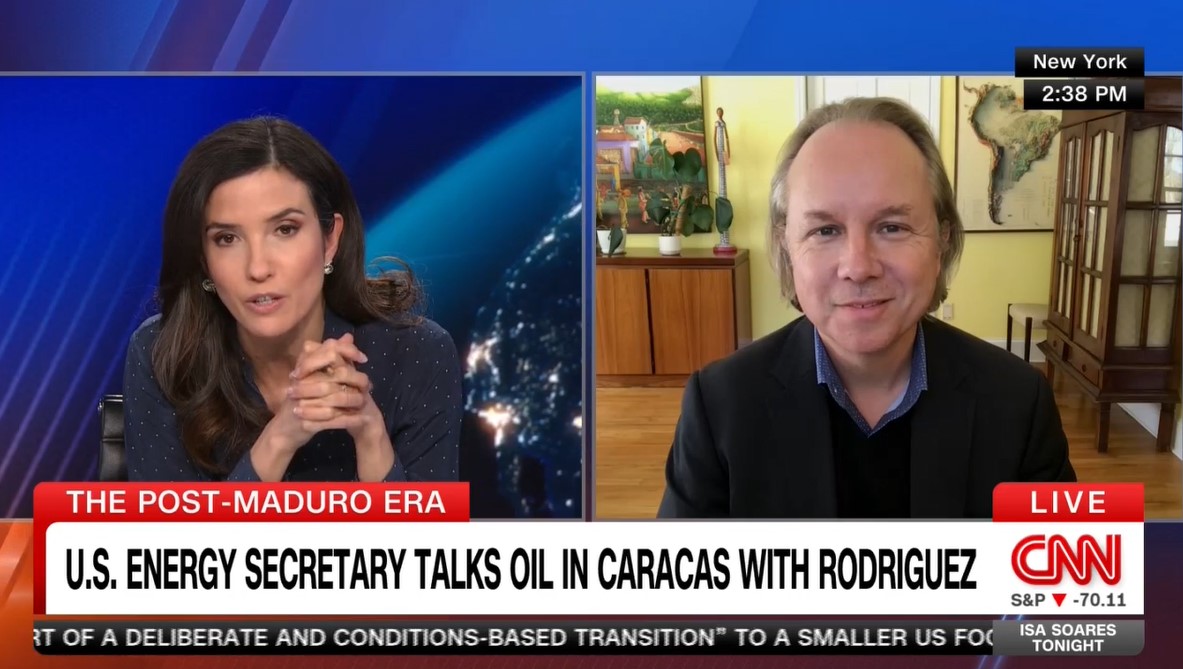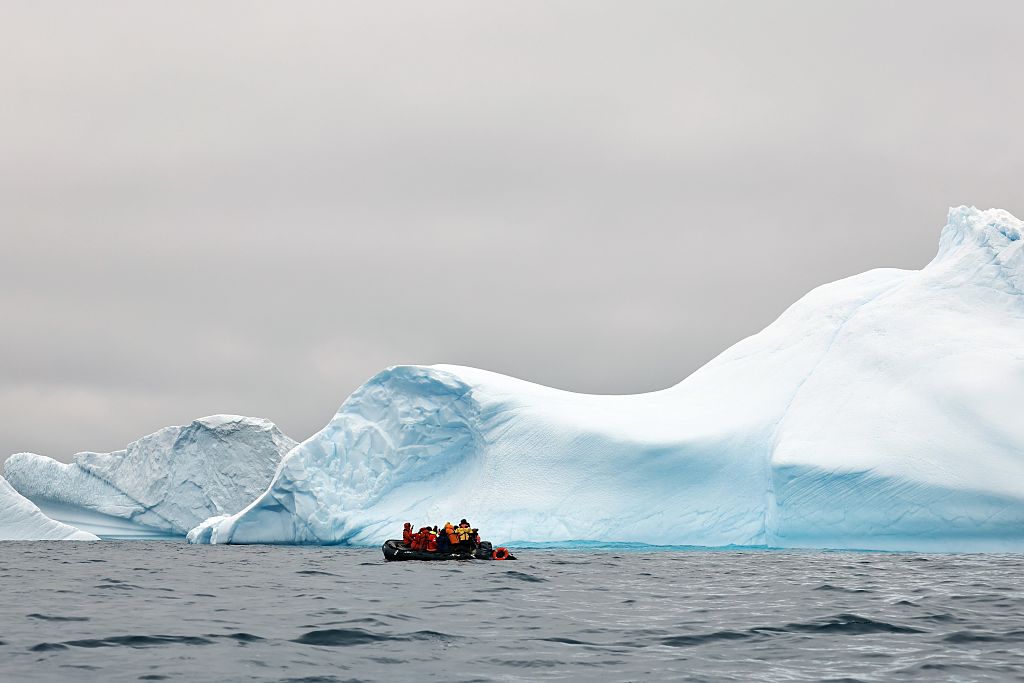52nd Washington Conference: Building a Sustainable, Resilient, and Equitable Future
52nd Washington Conference: Building a Sustainable, Resilient, and Equitable Future
High-level U.S. government officials and Western Hemisphere leaders discussed post-pandemic recovery and the Summit of the Americas to be held in June.
Washington D.C. May 12, 2022—The 52nd Annual Washington Conference on the Americas, co-hosted by Council of the Americas and the U.S. Department of State on Thursday, May 12, featured high-level U.S. government officials and leaders from across the Western Hemisphere to discuss the conference’s theme: “Building a Sustainable, Resilient, and Equitable Future.”
“As we head to the next Summit of the Americas, just four weeks from today, the hemisphere is facing some headwinds,” said Council of the Americas (COA) Vice President Eric Farnsworth in his welcoming remarks. “And yet, there is nothing that we cannot do…if we do it together, with willing partners, sharing values, pursuing a common agenda.”
Americas Society/Council of the Americas (AS/COA) President and CEO Susan Segal introduced and welcomed Assistant Secretary of State for Western Hemisphere Affairs Brian Nichols. He gave an overview of the upcoming Summit of the Americas’ focus areas, such as migration, digitalization, reinforcement of democracy, and economic recovery. “The Ninth Summit will support the implementation of our commitments to democracy and transparency, including free and fair elections; citizen participation; protection of human rights defenders, journalists, workers, women, and girls, and members of vulnerable and marginalized groups,” said Nichols. “[It] will provide a historic opportunity for us to come together with our allies and partners to reaffirm our commitment to our shared values and advance a concrete agenda to help democracies deliver for our citizens.”
Amazon Vice President for Latin America Sarah Jane Gunter introduced Deputy U.S. Trade Representative (USTR) Jayme White for an interview with Bloomberg’s Shery Ahn on building the regional trade agenda. “It’s very clear we have shared values [in the Western Hemisphere], whether it’s on climate or labor or the importance of getting trade done right,” said White. He highlighted the importance of having an inclusive trade policy that “takes into account the interests of workers and the environment.”
Segal introduced the U.S. International Development Finance Corporation CEO Scott Nathan, who discussed promoting development and investment in the Americas. “Our region also faces an extraordinary infrastructure gap, measured in the trillions, and we face a host of additional challenges, from income inequality to lack of basic services and employment,” said Nathan. “Along with these challenges comes a huge opportunity—the opportunity to invest in improving people's lives. We're focused on growing both the quantity and quality of DFC's investments in partnership with businesses that have a proven track record in their industry; solid business plans for achieving a significant and sustained impact; and a commitment to adhere to high labor, environmental, and other standards."
Following Nathan's speech, Farnsworth interviewed U.S. Senator (R-NE) Benjamin Sasse on trade as a strategic imperative. Senator Sasse said that the state of U.S. democracy is being highly impacted by the digital revolution. He added, “There are two big domestic problems we’re going to need to solve before there’s a broad American consensus about the benefits of trade again: the social media environment and the nature of lifelong work.”
The AES Corporation Senior Vice President, General Counsel, and Corporate Secretary Paul Freedman then introduced World Bank Group President David Malpass, who covered the urgency of economic recovery in Latin America and the Caribbean. “Spending restraint by governments and state-owned enterprises along with proactive debt management should be high priorities to build confidence and help attract new investment and jobs,” said Malpass. He emphasized that the Covid-19 pandemic and geopolitical tensions have created a demand for nearshoring that Latin America and the Caribbean are “well-positioned to embrace.”
After being introduced by General Motors’ Vice President & Head of Global Public Policy Omar Vargas, U.S. Deputy Secretary of Homeland Security John K. Tien took the virtual stage for keynote remarks on security, competitiveness, and migration. Tien said that President Joe Biden will present at the Summit of the Americas a declaration to “address unprecedented migration across the entire Western Hemisphere and highlight the need for stabilization, lawful pathways, humane migration management, and multilateral efforts.”
Tien also highlighted the key pillars to tackle migration’s root causes: Addressing irregular migration by reinvigorating investments in a safe, orderly, legal, and humane migration system; improving security; and enhancing competitiveness.
To close out the conference, the AES Corporation U.S. Global Executive Vice President & President Julian Nebrada moderated a panel on energy transition in the Americas. Trinidad and Tobago’s Minister of Energy Stuart Richard Young said that the country is a big advocate for the continuation of the use of natural gas. “We see a long future in gas…We’re looking for new sources of gas within our borders." Uruguay’s Minister of Industry, Energy, and Mining Omar Paganini talked about the country’s shift to renewable energy. “[From 2017-2020], more than 95 percent of our electricity came from renewable sources,” said Paganini. “It was a very quick and very remarkable transformation that also enabled us to transform into exporters.”
Georgia Institute of Technology President Angel Cabrera, explained his institution is focusing on circularity, building efficiency, and how to diversify sources. “We’re not just making a single bet, we’re going to have to make many different bets into how to build a circular economy, how to increase efficiency, how to explore alternative sources and make them economically viable.” “One area I’m particularly excited about and think there’s partnership opportunities is on clean energy supply chains,” said the US Deputy Secretary of Energy David Turk. “I think there’s a way to mutually work together," he said about Latin America.
Additional Resources:
For more information, please contact AS/COA Media Relations at mediarelations@as-coa.org.
To get conference materials, videos, and more, visit: as-coa.org/2022wca
Follow the conversation on Twitter: #2022WCA









